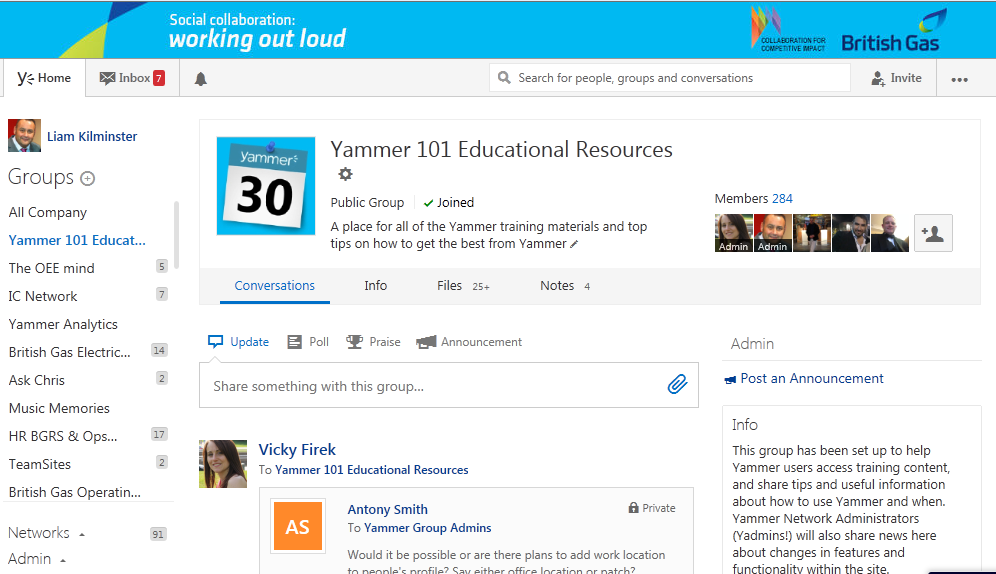
In social networks, group boundaries promote the spread of ideas, study finds
Editor’s note: Research into networks shows how ideas spread. Some good insights here into how groups affect the sharing of information across a network.

Editor’s note: Research into networks shows how ideas spread. Some good insights here into how groups affect the sharing of information across a network.

Editor’s note: This week Facebook unveiled Facebook for Work. It raised, once again, the topic of social networking tools within organisations and it brought me top this interview with Slack co-founder Stewart Butterfield. If you haven’t tried it then give it a go – it is a lightweight type of Yammer and is great for comms around projects. I like Butterfields comments on ‘institutional memory’. Aren’t these the tools that will bring to light much sought after ‘tacit knowledge’?

Editor’s note: This article looks at how British Gas trialled enterprise social network Yammer. Some good tips on how to get colleagues interested.
We caught up with consultant, blogger and thinker Harold Jarche ahead of his Learning Technologies…
Editor’s note: Imagine liberating content from an LMS and looking at content consumption from a network perspective. This short article explores this idea and the relationships between articles.
This deck from Michael Bernstein of the Stanford Computer Science Department, shares research on how…
Not sure there is a ‘perfect’ update but some useful insights here. Thanks to Mycustomer…
Editor’s note: This survey suggests that teenagers are more interested in communication and feeds of updates rather than profiles and are less interested in the more mainstream social networks than we may think.
Editor’s note: To mark Twitter’s birthday this week, this article looks at the early days, where the service is now and what the future holds.
Editor’s note: An indepth look at how organisations have used the social functions of intranets. There is a 217-page report to download should you want it. This article provides a good overview of the research findings.
Editor’s note: Researchers examine the causes of the death of social networking platform Friendster. A network made of many people with only one or two friends is less resilient – if people start to leave then others are left with just one friend and tend to leave too.The cost-benefit ratio of being a part of the community is also critical the researchers say. (Thanks to @broadstuff for sharing)
Editor’s note: This is an abstract of research which might be worth looking into a bit more deeply. The abstract suggests research shows use of social networks at work leads to positive emotional response from those who use them and this impacts positively on their work. But managers can feel isolated.
Editor’s note: A short article that shows the impact of mobile on the growth social networks.
Editor’s note: Steve Wheeler shared this slide at the World of Learning conference. It’s a great image which reflects the exponential growth in the web and user-generated content.
Editor’s note: An in-depth look at why designing enterprise social software for humans and human interaction is key to getting colleagues to start using such tools. As the author says, ‘we need to do a much better job at understanding the cultural context in which people work and how “work” fits into a broader social context’.
